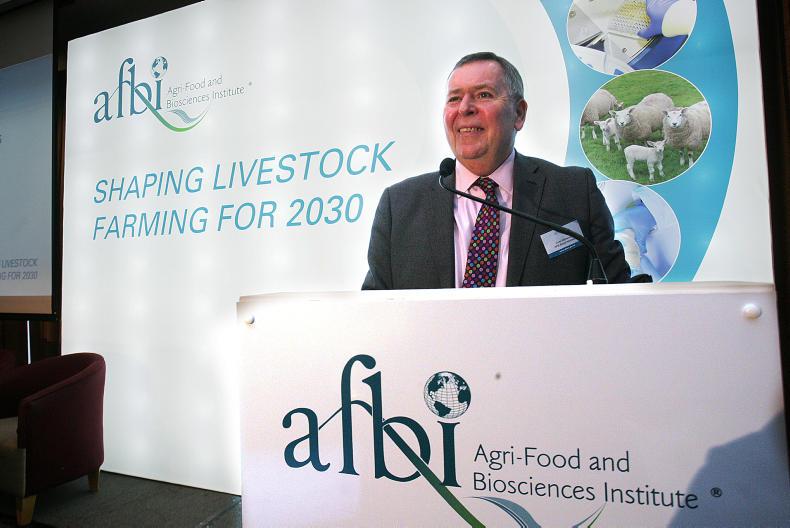A report by the comptroller and auditor general, Kieran Donnelly, has highlighted a number of failings within governance at the Agri-Food and Biosciences Institute (AFBI).
It follows an audit of AFBI’s 2016/2017 financial statements which “uncovered evidence of behaviour and standards that fall short of those a public sector body should display”.
Specifically, the report highlights how AFBI issued a number of invoices, to the value of close to £1.8m, without most of the expenditure having been incurred, in order to facilitate the drawdown of government money.
That money was coming from the Department for Business, Energy and Industrial Strategy (BEIS) in London, and earmarked for the Centre for Innovation Excellence in Livestock (CIEL), of which AFBI is a founder member. From the period of 31 March 2016 to 31 March 2019, AFBI is to receive £3.6m from CIEL to purchase new equipment for dairy, beef, sheep and pig research at its Hillsborough site.
In March 2016 AFBI issued three invoices to CIEL, to the value of £0.5m, despite no actual expenditure being incurred by this date. A further invoice to the value of £1.267m was issued in March 2017, but at this point only £436,460 of eligible expenditure had been incurred.
The key issue for AFBI and CIEL was that the funding coming from BEIS had to be used in a financial year, or would effectively be lost. So the invoices were intended to ensure that AFBI would be able to draw down the full budget allocation. By December 2017 the assets purchased using the £1.767m were all in place.
However, the decision to issue invoices before purchasing equipment was not to the liking of the comptroller and auditor general.
“What is of most concern is that these actions were taken with the full knowledge of senior management and authorised by AFBI’s chief executives,” reads the report. In March 2016, the organisation was led by Professor Seamus Kennedy, and in March 2017 by Dr Sinclair Mayne. Both have since retired.
The report is also critical that an AFBI employee (understood to be current AFBI deputy chief Dr Elizabeth Magowan) was appointed to the board of CIEL in 2016, suggesting that this was a possible conflict of interest.
In response to the report, AFBI has put in place new governance and gave assurances that future invoices will only be issued when assets are purchased.
It is not the first time that AFBI has fallen foul of the comptroller and auditor general. A report from September 2013 was critical of poor management and control over projects within AFBI, and led to a fairly bruising encounter for AFBI and DAERA top brass at the Stormont Public Accounts Committee later that year.
Read more
AFBI review rules out CAFRE tie-up
Profiting from AFBI dairy research
A report by the comptroller and auditor general, Kieran Donnelly, has highlighted a number of failings within governance at the Agri-Food and Biosciences Institute (AFBI).
It follows an audit of AFBI’s 2016/2017 financial statements which “uncovered evidence of behaviour and standards that fall short of those a public sector body should display”.
Specifically, the report highlights how AFBI issued a number of invoices, to the value of close to £1.8m, without most of the expenditure having been incurred, in order to facilitate the drawdown of government money.
That money was coming from the Department for Business, Energy and Industrial Strategy (BEIS) in London, and earmarked for the Centre for Innovation Excellence in Livestock (CIEL), of which AFBI is a founder member. From the period of 31 March 2016 to 31 March 2019, AFBI is to receive £3.6m from CIEL to purchase new equipment for dairy, beef, sheep and pig research at its Hillsborough site.
In March 2016 AFBI issued three invoices to CIEL, to the value of £0.5m, despite no actual expenditure being incurred by this date. A further invoice to the value of £1.267m was issued in March 2017, but at this point only £436,460 of eligible expenditure had been incurred.
The key issue for AFBI and CIEL was that the funding coming from BEIS had to be used in a financial year, or would effectively be lost. So the invoices were intended to ensure that AFBI would be able to draw down the full budget allocation. By December 2017 the assets purchased using the £1.767m were all in place.
However, the decision to issue invoices before purchasing equipment was not to the liking of the comptroller and auditor general.
“What is of most concern is that these actions were taken with the full knowledge of senior management and authorised by AFBI’s chief executives,” reads the report. In March 2016, the organisation was led by Professor Seamus Kennedy, and in March 2017 by Dr Sinclair Mayne. Both have since retired.
The report is also critical that an AFBI employee (understood to be current AFBI deputy chief Dr Elizabeth Magowan) was appointed to the board of CIEL in 2016, suggesting that this was a possible conflict of interest.
In response to the report, AFBI has put in place new governance and gave assurances that future invoices will only be issued when assets are purchased.
It is not the first time that AFBI has fallen foul of the comptroller and auditor general. A report from September 2013 was critical of poor management and control over projects within AFBI, and led to a fairly bruising encounter for AFBI and DAERA top brass at the Stormont Public Accounts Committee later that year.
Read more
AFBI review rules out CAFRE tie-up
Profiting from AFBI dairy research






 This is a subscriber-only article
This is a subscriber-only article










SHARING OPTIONS: